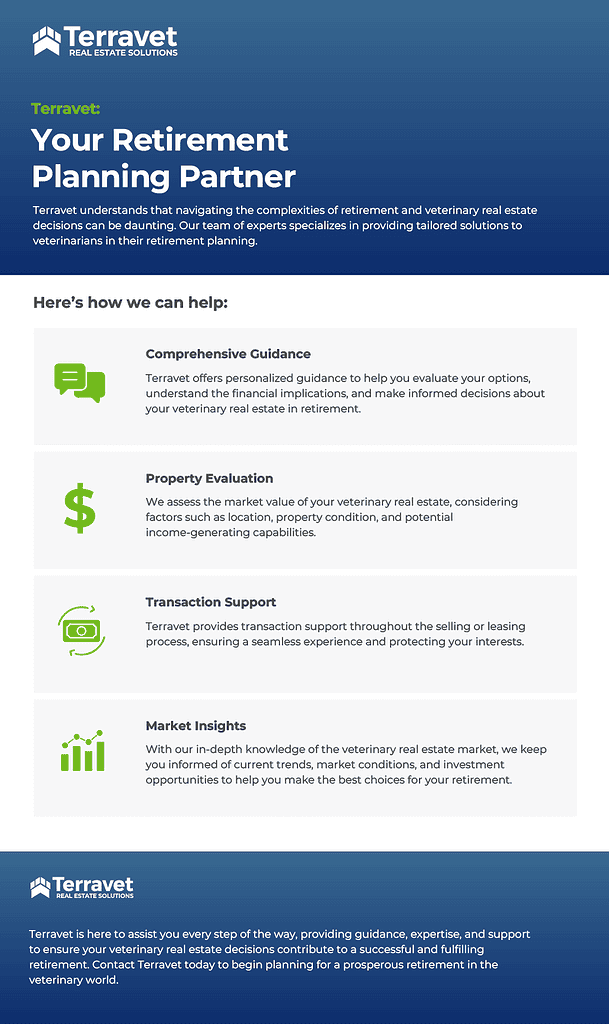As a veterinarian approaches retirement, one of the crucial decisions you’ll face is what to do with your veterinary real estate. The choice you make can have significant implications for your financial future and overall retirement plan. In this article, we will explore the different options available, discuss the pros and cons of each, and highlight how Terravet can provide valuable assistance in navigating this important transition.
Option 1: Selling Your Veterinary Real Estate
Pros of Selling:
- Financial Liquidity: Selling your veterinary real estate can provide a significant lump sum of cash, giving you financial liquidity to support your retirement goals and lifestyle.
- Simplified Responsibility: By selling the property, you transfer the responsibilities of ownership, including maintenance, repairs, and property management, to the new owner.
- Investment Diversification: By selling and reinvesting the proceeds, you have the opportunity to diversify your investments and potentially earn additional income streams.
Cons of Selling:
- Loss of Equity and Potential Appreciation: Selling means giving up any future equity growth or potential appreciation in the value of the property.
- Capital Gains Tax: Selling the property can trigger capital gains tax, which may impact the amount of funds you can retain from the sale.
Option 2: Renting or Leasing Your Veterinary Real Estate
Pros of Renting or Leasing:
- Passive Income: Renting or leasing your veterinary real estate allows you to generate regular income in retirement without the responsibilities of daily property management.
- Retaining Ownership Benefits: By becoming a landlord, you retain ownership of the property and have the potential for long-term appreciation and tax advantages.
- Flexibility: Renting or leasing offers flexibility, allowing you to adjust lease terms, rental rates, or potentially sell the property in the future if desired.
Cons of Renting or Leasing:
- Property Management: Renting or leasing requires active property management, including finding tenants, addressing maintenance issues, and ensuring rental income is consistent.
- Tenant Challenges: Dealing with problematic tenants, late payments, or lease disputes can create additional stress and financial strain. Also, a demand for more purpose built hospitals/state of the art space for the quality of care has increased the instances of tenants vacating properties.
- Market Volatility: Economic fluctuations and changes in the local real estate market can impact rental rates and the overall demand for veterinary real estate.
Terravet: Your Retirement Planning Partner
Terravet understands that navigating the complexities of retirement and veterinary real estate decisions can be daunting. Our team of experts specializes in providing tailored solutions to veterinarians in their retirement planning. Here’s how Terravet can help:
- Comprehensive Guidance: Terravet offers personalized guidance to help you evaluate your options, understand the financial implications, and make informed decisions about your veterinary real estate in retirement.
- Property Evaluation: We assess the market value of your veterinary real estate, considering factors such as location, property condition, and potential income-generating capabilities.
- Transaction Support: Terravet provides transaction support throughout the selling or leasing process, ensuring a seamless experience and protecting your interests.
- Market Insights: With our in-depth knowledge of the veterinary real estate market, we keep you informed of current trends, market conditions, and investment opportunities to help you make the best choices for your retirement.

In addition to deciding what to do with your veterinary real estate, there are several other important considerations when planning for retirement as a veterinarian. Here are some key steps to take:
- Evaluate Your Financial Health: Assess your current financial situation, including savings, investments, and retirement accounts. Determine if you have enough funds to support your desired retirement lifestyle and if adjustments need to be made to meet your goals.
- Develop a Retirement Budget: Create a comprehensive budget that outlines your projected expenses in retirement. Consider factors such as healthcare costs, living expenses, travel, hobbies, and potential long-term care needs. Having a clear understanding of your financial requirements will help guide your retirement planning decisions.
- Explore Retirement Account Options: Investigate retirement account options available to veterinarians, such as individual retirement accounts (IRAs), 401(k) plans, or other tax-advantaged savings vehicles. Maximize contributions to these accounts to take advantage of potential tax benefits and ensure a robust retirement nest egg.
- Assess Insurance Needs: Review your insurance coverage, including health insurance, disability insurance, and liability insurance. Determine if adjustments or additional policies are necessary to protect yourself and your assets during retirement.
- Succession Planning: If you own a veterinary practice, develop a succession plan to ensure a smooth transition and continuation of your practice after retirement. Identify potential successors or consider selling the practice to a qualified buyer. Seek professional advice to guide you through this process.
- Seek Professional Financial and Legal Advice: Consulting with financial advisors, accountants, and estate planning attorneys who specialize in working with veterinarians can provide invaluable guidance. They can help you optimize your retirement strategy, minimize tax implications, and ensure your estate plan is in order.
- Consider Continuing Education or Part-Time Work: Some retiring veterinarians choose to continue their involvement in the field through part-time work, consulting, or teaching. Explore opportunities to stay engaged professionally on your own terms, if desired.
By addressing these aspects of retirement planning alongside the decision about your veterinary real estate, you can establish a comprehensive retirement strategy that aligns with your goals and aspirations.
Conclusion
As you plan your retirement, deciding what to do with your veterinary real estate is a critical step. Consider the pros and cons of selling, renting, or leasing, and choose an option that aligns with your financial goals, retirement lifestyle, and long-term vision. Remember, Terravet is here to assist you every step of the way, providing guidance, expertise, and support to ensure your veterinary real estate decisions contribute to a successful and fulfilling retirement. Contact Terravet today to begin planning for a prosperous retirement in the veterinary world.



